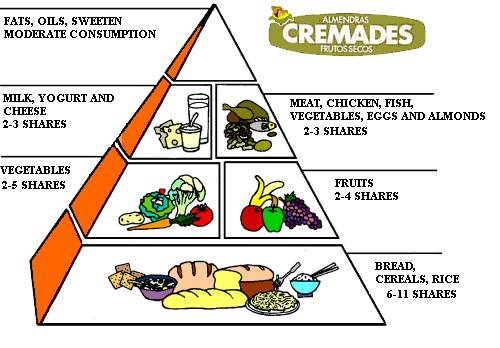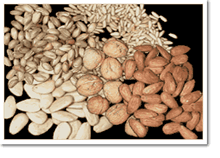 |
| Almond as
a nutrient: |
 |
Different types of almonds
can be commercialized under different varieties, shapes and sizes.
Nevertheless, nutritional values remain invariable in all of them.
Almonds are nutritious and have a high power content. Nutritional
details are shown below:
| Content
of vitamins in 100 gr. of almond |
|

|

|
|
Carotene (A
Vitamin)
|
0.12 mg.
|
|
B1 Vitamin
|
0.22 mg.
|
|
B2 Vitamin
|
0.62 mg.
|
|
Pantothenic Acid
(B5 Vitamin)
|
0.58 mg.
|
|
B3 Vitamin
|
4.18 mg.
|
|
B6 Vitamin
|
0.06 mg.
|
|
Folic Acid
|
0.05 mg.
|
|
C Vitamin
|
0.80 mg.
|
|
Although almonds are
relatively rich in fats, most of them are not saturated (60%
monounsaturated fats), reporting healthful benefits, reducing bad
cholesterol (LDL) and increasing good cholesterol levels (HDL).
| Nutritional
values in 30 gr. of almond |
|

|

|
|
Calories
|
170 gr.
|
|
Total greasy
|
15 gr.
|
|
Fats saturated
|
1 gr.
|
|
Cholesterol
|
0 mg.
|
|
Sodium
|
0 mg.
|
|
Total
carbohydrate
|
5 gr.
|
|
Fibre dietetic
|
4 gr.
|
|
Sugars
|
1 gr.
|
|
Proteins
|
7 gr.
|
|
High level of essential
nutrients (phosphorus, magnesium, proteins, vitamins, fiber) and high
level of healthful fats make almond a healthy nutrient, highly
recommended in the prevention of heart disease and as a cancer
preventive.
The pyramid of food consists of five main groups necessary to obtain
our daily portion of nutrients and calories. Almond is rich in
proteins, vitamins and minerals for a healthful and balanced diet.

|
Composition and nutritional
value of dried fruit:
|
 |
• Dried fruits contain proteins of
excellent biological quality, remarking arginine for its benefit to the
cardiovascular system.

• Dried fruits contain heart friendly fatty acids, specially oleic
acids, which help to decrea "bad" cholesterol or LDL levels reporting a
smaller impact on the vascular walls.
• Dried fruits contain a certain number of sterols or
phytosterols, reducing cholesterol presence in the thin intestine and
helping to improve cholesterol levels in blood.
• High fiber content in dried fruits provides several good effects
to the body, both for the gastro-intestinal system and for different
metabolic processes. For example: sensation of satiety, decrease of
cholesterol levels and regulation of intestinal transit.
• Antioxidative content (vitamin E)
in dried fruits is also important since it reduces negative effects of
free radicals on cardiovascular diseases, cancer and the process
of aging.
• Dried fruits contain certain amount of vitamins of group B,
remarking folic acid which balances the usual deficit in our organism
and is needed to synthesize RNA and DNA. It is also preventive on
anemia, fatigue and loss of the appetite.
• Finally, healthful mineral content of dried fruit must be
remarked. Calcium, magnesium, potassium and sodium develop and maintain
skeleton and take part on the control of the arterial pressure.
|
Five takes of
dried fruit per week reduce myocardium infarct risk in a 51% .
Scientific
studies report dried fruits in the context of Mediterranean diet help
to fit the line, in the long run, to even lose weight.
|
|
  |